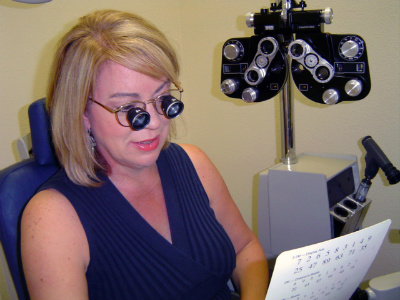LOS ANGELES—Individuals who suffer from visual impairment should not give up hope that they will again be able to read, drive or fully witness with their own eyes the best life has to offer, as there is much Low Vision Optometry of Southern California can do to help
“Patients are told that nothing else can be done, when low vision care can provide them with greater independence and the ability to do tasks they were not able to do before,” said Dr. Lisa Limtiaco. “This adds so much to their quality of life.”
They can benefit from custom-made glasses with telescopic lenses, special tints and curvatures that allow them to improve their vision even without the use of magnification. With these glasses, an 80-year-old woman with macular degeneration was able to again read, watch TV and play bridge with her friends. She was previously depressed, had not left her house in more than three years and would no longer speak.
It is very challenging for the best of doctors, who have very busy practices, to keep up with the latest advancements in the eye care field. However, International Academy of Low Vision Specialists (IALVS) are extensively trained in advanced optics and magnification principles to which other doctors have limited exposure. They also have the patience to work with patients who are fearful or depressed about their conditions so as to explain to them what their visual future may yet hold.
IALVS is a prestigious organization for optometrists and ophthalmologists who focus on helping patients with low vision. It was founded by Dr. Richard Shuldiner, who has practiced for 37 years and worked with famous patients such as legendary actress Jane Russell and current patient Carroll Shelby, the founder of Shelby Auto.
The organization has multiple Southern California offices for patients who have difficulty securing rides to appointments for eye exams and these offices are different from others. Doctors spend an hour, sometimes more, meeting with patients who have lost vision as a result of macular degeneration, diabetic retinopathy and other conditions in order to tailor solutions and prescriptions that will meet visual needs they identify on a “wish list.”
An 82-year-old farmer named Charles B. from Central California suffered from tunnel vision, which causes those with the condition to have poor mobility and bump into walls. In his wish list, the man wanted to be able to again pick up the newspaper on his very long driveway and better read the stories contained inside its pages. When he was prescribed special reverse telescopic lenses, he was able to walk without the support of a cane and could peripherally see his wife standing off to the side.
“When he started walking with confidence and was able to go up and down the curbs, both he and his wife started crying and were very grateful at what the glasses could provide for him,” Limtiaco said.
Bioptic telescopic lenses gave Cory Smith, a young mother with myopic degeneration, the ability to work on her computer again. They also gave patient Dorothy C. back the ability to get around in her vehicle. “I’m now able to drive again and be independent with these bioptic glasses!” she said.
IALVS doctors also counsel patients and families on nutritional supplements that can prevent vision loss, proper lighting, mobility concerns and UV protection, as the proper tint in many cases can make a big difference. They not only offer their expertise, but also their passion for helping others.
Limtiaco, for example, wanted to become an eye doctor while growing up after she read an article about an eye doctor who flew to the Alaskan Bush and provided eye care to people without access to it.
“This was my dream to be able to improve the quality of life for people, particularly those who had special needs either with physical impairment, or little or no access to health care” Limtiaco said.
For more information, visit the organization’s website at www.ialvs.com or call 888-778-2030






